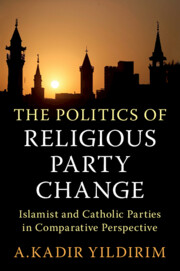‘Religious parties around the world, such as the Muslim Brotherhood associated parties of the Arabic-speaking counties, or the Christian Democratic parties of Western Europe, all began their lives as traditionalist organizations fervently opposed to the expansion of personal freedoms and deeply skeptical of political democracy. And yet some of these parties evolved not just to accommodate themselves to these things, but to actively champion them, while others remained as they were, tilting against the social and cultural change and waging war on modernity itself. In explaining this difference, A.Kadir Yildirim has produced a model of comparative social science and an instant classic in the study of religion and politics.’
Tarek Masoud - Harvard University
‘In this innovative and deeply comparative analysis, A.Kadir Yildirim shows how political Islam and political Catholicism diverged from their common anti-system stances. Different degrees of centralization, hierarchy, and internal competition meant that Islamic political parties would have greater freedom to persist as anti-system parties, while Catholic parties eventually embraced democracy. For students of religion and politics, and of partisan politics, this is a must-read.’
Anna Grzymala-Busse - Stanford University
‘Yildirim has written a compelling and insightful book on the role of institutionalized religious authority in shaping the divergent secular patterns of Catholic and Islamist parties. Yildirim argues that centralized religious Catholic authority facilitated secular developments among Catholic parties, whereas the decentralized nature of Islamic religious authority impeded secularization among Islamic parties. The book relies on carefully well-researched case studies from the Middle East and Europe and puts forth a nuanced account of secularization patterns across Islam and Catholicism.’
Amaney Jamal - Princeton University
‘Religious parties are often studied on a case-by case basis even though they arise in many different societies and various faith traditions. By viewing them comparatively, Yildirim uncovers how their relationship with two other actors-formal religious authorities and the broad social movements that spawn them-shape their political trajectory.’
Nathan Brown - Professor of Political Science and International Affairs, George Washington University
‘Yildirim’s argument is dense and nuanced, and the research will appeal mostly to experts in the field … Recommended.’
P. Rowe
Source: Choice



